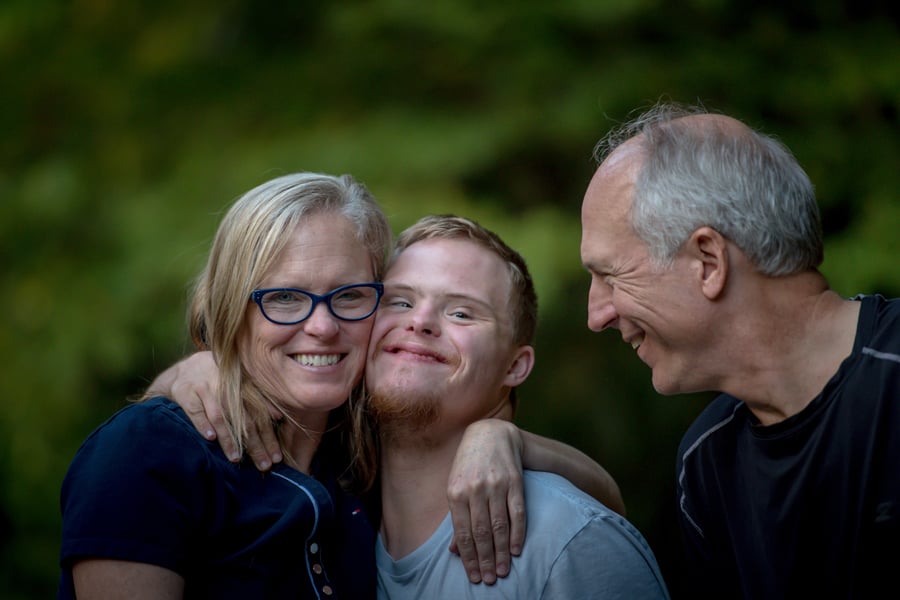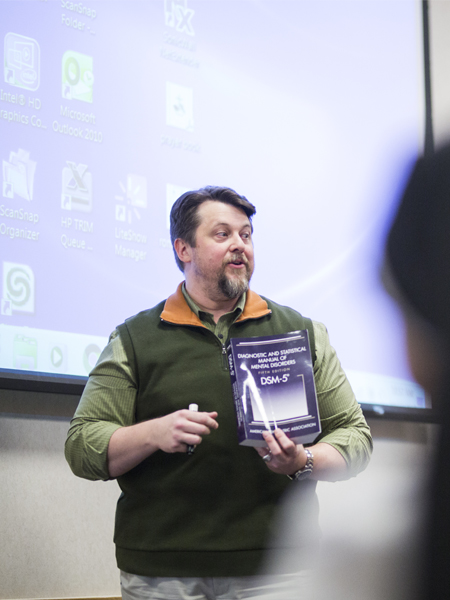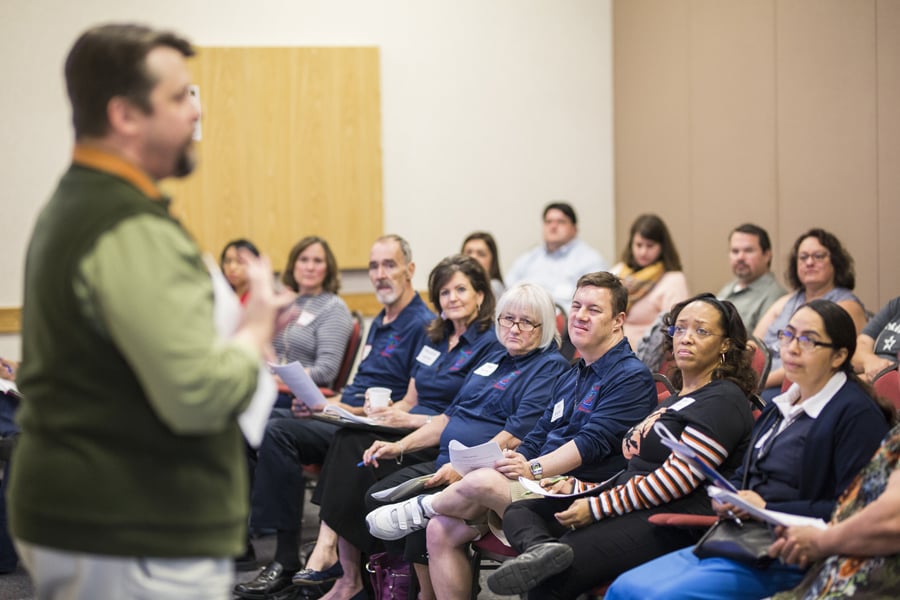Diocesan conference stresses inclusion of parishioners with disabilities, special needs

FORT WORTH — Before a crowd of catechists, parents, mental health professionals, directors of religious education, and parish leaders, Jason Whitehead, diocesan director of Faith Formation, read aloud from a pastoral document published last year by the U.S. Catholic bishops.
“The Church continues to affirm the dignity of every human being,” the opening sentence of the Guidelines for the Celebration of the Sacraments with Persons with Disabilities reads. It continues with, “Likewise, the Church recognizes that every parish community includes members with disabilities and earnestly desires their active participation.”
It’s an apt reminder of the Catholic’s call to include everyone into the celebrations of the life of the Church. Whitehead said his passion for such issues derives from the fact that his son is autistic.
The above applies to all, Whitehead said, yet added that such is not common knowledge throughout the diocese.
“I’ve often heard from people that they don’t see anyone with special needs in their parish,” Whitehead said. “I say it’s because we were in hiding. That was my reaction to a number of parishes in this diocese that, when I tried to attend Mass or just go into the chapel with my son who hadn’t yet learned how to behave in church, I was either explicitly or implicitly uninvited. There was no room at the inn shall we say.”
Annemarie Bohn, a mother of disabled children and a parishioner at St. Martin de Porres in Prosper, agreed.
“Disorders run so across the spectrum that it’s hard to know sometimes,” Bohn said. “Clearly, someone with a severe handicap or mental disorder — you can see that. But you can’t typically see depression and other things. I’ve had people turn and look funny at my son when he’s done something because of that. So the challenge is to work to better educate the entire parish and diocese.”
Bohn, who performs homebound education for Frisco ISD, was one of about 35 attendees at the Oct. 27 Annual Special Needs Workshop at the Catholic Center.
“We’ve done this the last couple of years,” Whitehead said. “I plan on keeping this central conference each October but also scheduling more training sessions through the year.”
Spreading the word has been a challenge to say the least.
“It’s a huge hurdle to overcome,” Whitehead said. “Just the general misunderstandings out there, central misunderstandings on the nature of developmental delay and disabilities in and of themselves, and then the application of Church law as laid out in the [USCCB document].”

In some respects apprehension and/or misunderstanding toward those suffering disabilities is understandable, Whitehead said, especially among those who have little or no direct connection to disabled individuals.
“Absolutely,” Whitehead said. “Before my son was born, my concept of autism was the movie ‘Rain Man.’” My son being diagnosed and learning everything about it was a huge wake up call.”
And yet, it’s essential to welcome and include disabled individuals into the sacraments and all aspects of parish life, he said.
“All members of the Body of Christ are uniquely called to God by virtue of their Baptism,” Whitehead said. “In light of this call, the Church seeks to support all in their growth and holiness. Every human being is created in the image and likeness of God. As such they have inherent dignity and inherent purpose. That purpose is the beatific in the hereafter. There are no exceptions.
“Participating in and being nourished by the sacraments is essential to this growth in holiness.”
Whitehead made quick work of one myth.
“You sometimes hear that if someone has special needs they’re inherently holy and automatically going to heaven,” Whitehead said. “I love my son, but he’s his father’s son and, unfortunately, not inherently holy. He bears original sin just like his old man and needs to learn holiness just like I do.”
Whitehead also referred to the USCCB’s document as more than mere suggestion or gentle reminder.
“It’s an almost fatherly way of saying, ‘We said this about 10 times before and now we’re saying it again a little more explicitly.’
“It’s stressing that it’s essential that all forms of liturgy be accessible to those with disabilities since these forms are the essence of the spiritual tie that binds the Christian community together and there should be no isolation or exclusion for those with disabilities. That includes even passive omission.”
That places responsibility on parish officials.
“Pastoral ministers should not presume to know the needs of persons with disabilities, but should rather — before all else — consult with them or their advocates before making determinations about the accessibility of a parish’s facilities and the availability of its programs, policies, and ministries,” according to the USCCB document. “Full accessibility should be the goal for every parish.”
Whitehead discussed the document’s guidelines as they pertain to sacramental inclusion for those with disabilities and the importance of proper intake and assessment for such parishioners.
Such can never be a one-size-fits-all approach.
“It must be adapted in content and method to the particular situations of children and adults with special needs,” Whitehead said. “In other words, individualized catechesis. And, in case you’re wondering parish directors and coordinators, yes, that means more work. Individualized catechesis is absolutely hard. You have to be creative, have to be personally accommodating.”
That was music to the ears of attendee Niki MacDougall, who serves as director of religious education at St. Martin de Porres.
“When I taught at the Diocese of Arlington, Virginia, I had 10 special needs students my first year, kids across the whole spectrum. That made a big impression. I want everyone to experience the love of Christ and that’s what got me interested in special needs.”
MacDougall agreed that the challenge of championing the need for inclusion of disabled parishioners is huge.
“I think [it’s] lack of education and a lot of people simply don’t realize the need exists,” MacDougall said. “Education has come so far but parish life hasn’t always kept pace maybe because people look at catechetics differently.
“But we have the conveyor belt mentality. In catechetics, especially, being theologically sound is important but being developmentally sound will mean they understand what you’re trying to say. Because otherwise, they’re not going to understand it and they need to because they have a right to that relationship with Christ.”
The Church guidelines are important for diocesan officials, parish ministers, and all who interact with disabled individuals, MacDougall said. More important, she said, is awareness by all.
“The entire parish has to be involved and aware of special needs ministries in one way or another,” MacDougall said. “It can’t be isolated to just those affected and those working with them. And it can’t be just one person or one group’s job. It really has to be the entire parish.”
St. John the Apostle parishioner Marci Bourke is assisting St. John Coordinator of Religious Education Jessica Ramirez in starting a special needs program.
Bourke echoed MacDougall’s call for outreach and raising awareness.
“A lot is lack of education but also awareness in general,” Bourke said. “I have a niece who’s severely autistic. But if I didn’t have that situation I don’t know that special needs is something I would have thought to become involved in.
“Outreach is important because the unfortunate fact is a lot of parents of children with special needs don’t come to Mass or aren’t around the parish enough to hear about these programs.
“Finding volunteers is tough, too. But, you don’t need to have experience with special needs students to help. You just need to determine if this is somewhere in your heart to help.”

Jason Whitehead presented at the Annual Special Needs Workshop at the Catholic Center. (NTC/Juan Guajardo)
